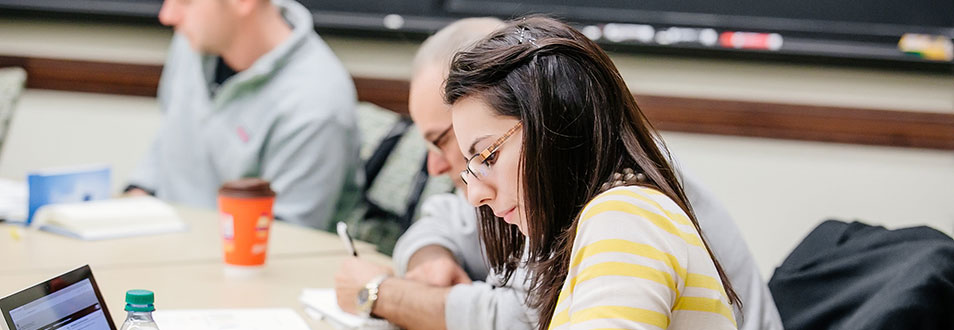The Certificate in Neuroscience Program
THE NEUROSCIENCE PROGRAM WILL STOP OFFERING A CERTIFICATE FOLLOWING THE 2026-27 ACADEMIC YEAR.
The Certificate in Neuroscience Program offers biology and psychology majors the opportunity to participate in an integrated course of study — from the molecular level to gross brain anatomy — that focuses on nervous system structures, functions, and behavior.
Who can enroll?
The program is available to biology and psychology majors only. Students interested in applying to the program must take BIO 103 [General Biology I] and BIO 104 [General Biology II] during their freshman year.
How many students can enroll?
Twelve students from the Classes of 2025, 2026, and 2027 will be admitted per year. They will be chosen by a committee comprised of faculty members from the biology and psychology departments.
How do I enroll?
Most students majoring in either biology or psychology will apply to the program during the second semester of their freshman year, though students who are double majoring in both biology and psychology are invited to apply also in September of their sophomore year. For freshmen, the application requires submitting a copy of first semester grades and a statement of interest by the Tuesday after Presidents’ Day. A first-semester minimum GPA of 3.0 will be required to apply to the program but second semester mid-term grades also will be considered in assessing an applicant’s academic potential.
The statement of interest will be no more than two pages long. Applicants will be asked to state their reasons for applying to the program, their career goals, their research interests, and how this integrated program will be of benefit to them. Written materials will be used to determine finalists for whom interviews may be conducted. Evaluation of the interview and written materials will determine final inclusion into the program. There will not be any specific criteria for students’ continuation in the program other than their remaining in good standing within their respective departments and in the College.
Courses
For Biology Majors
Biology students must complete all requirements for the biology major, including BIO 360 [Neurobiology], and two from the following:
- BIO 201 – Comparative Anatomy
- BIO 205 – Human Anatomy
- BIO 308 – Modern Genetics
- BIO 310 – Evolution
- BIO 320 – Developmental Biology
- BIO 330 – Comparative Biomechanics
- BIO 350 – Animal Behavior
- BIO 405 – Physiology
- BIO 410 – Electron Microscopy
The following psychology courses are required:
- PSY 100 – Introduction to Psychology
- PSY 201 – Research Design & Statistical Analysis I
- PSY 202 – Research Design & Statistical Analysis II
- PSY 324 – Psychology of Abnormal Behavior or PSY 303 – Learning
- One course from each of the following groups is required:
- PSY 315 – Human Neuropsychology or PSY 326 – Biopsychology
- PSY 405 – Research in Neuropsychology or PSY 426 – Experimental Biopsychology
- All students must take the neuroscience capstone during senior year:
- BIO 475 – Advanced Topics Seminar or PSY 470, 471, 472 – Selected Topics in Psychology
For Psychology Majors
Psychology students must complete all requirements for the major, including at least one psychology course from each of the following groups:
- PSY 315 – Human Neuropsychology or PSY 326 – Biopsychology
- PSY 405 – Research in Neuropsychology or PSY 426 – Experimental Biopsychology
- PSY 324 – Psychology of Abnormal Behavior or PSY 303 Learning
- PSY 303 – Learning, PSY 316 – Cognitive Psychology, PSY 325 – Health Psychology, or PSY 482 – Drugs and Behavior
The following biology courses are required:
- BIO 103 – General Biology I
- BIO 104 – General Biology II
- BIO 200 – Cell Biology and Molecular Genetics
- BIO 360 – Neurobiology
Two biology courses from the following are required:
- BIO 201 – Comparative Anatomy
- BIO 205 – Human Anatomy
- BIO 308 – Modern Genetics
- BIO 310 – Evolution
- BIO 320 – Developmental Biology
- BIO 330 – Comparative Biomechanics
- BIO 350 – Animal Behavior
- BIO 405 – Physiology
- BIO 410 – Electron Microscopy
All students must take the neuroscience capstone during senior year:
- BIO 475 – Advanced Topics Seminar or PSY 470, 471, 472 – Selected Topics in Psychology
Information for Biology-Psychology Double Majors
Students can double major in biology and psychology and earn the Neuroscience certificate. In planning their schedules, double majors should keep in that the following courses can fulfill requirements in both majors:
- BIO 475 – Advanced Topics Seminar or PSY 470, 471, 472 – Selected Topics in Psychology (the neuroscience capstone) – fulfills psychology “in-depth” course requirement and oral proficiency requirement.
- PSY 315 – Human Neuropsychology and PSY 326 – Biopsychology – fulfills “biological processes” requirement for psychology and counts as a biology elective.
- PSY 426 – Experimental Biopsychology – fulfills 400-level lab requirement for psychology and counts as biology lab elective.
- BIO 360 – Neurobiology – required for biology and counts as a psychology elective.
- BIO 320 – Developmental Biology – counts as both a biology and psychology elective.
Dr. Victoria Templer ( On Sabbatical until July 1 2026)
Neuroscience Program Director / Professor of Psychology
Science Complex 0124
401.865.1214






